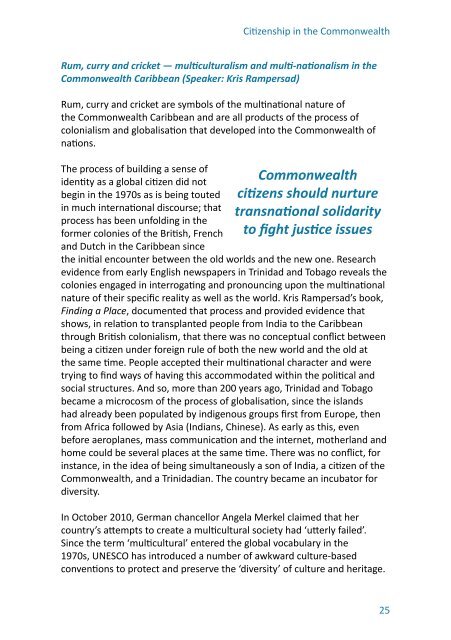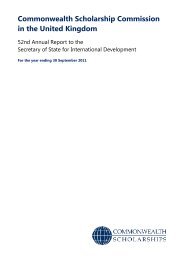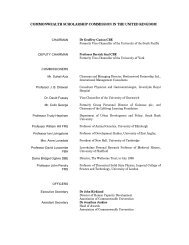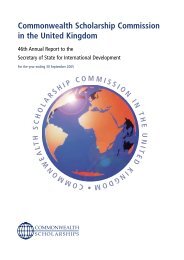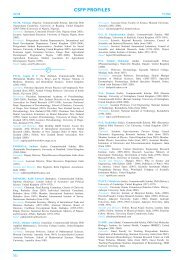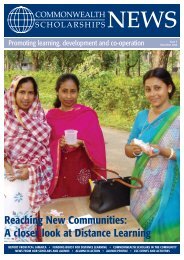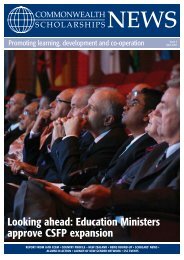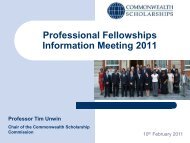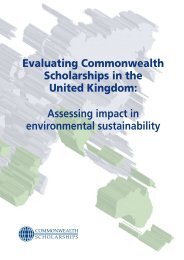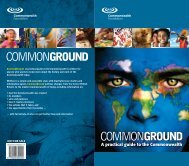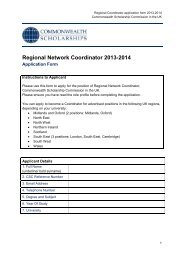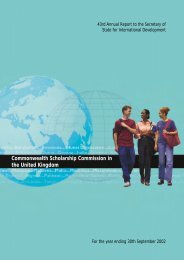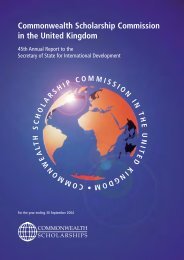Citizenship and the Commonwealth The Active Commonwealth ...
Citizenship and the Commonwealth The Active Commonwealth ...
Citizenship and the Commonwealth The Active Commonwealth ...
You also want an ePaper? Increase the reach of your titles
YUMPU automatically turns print PDFs into web optimized ePapers that Google loves.
<strong>Citizenship</strong> in <strong>the</strong> <strong>Commonwealth</strong>Rum, curry <strong>and</strong> cricket ― multiculturalism <strong>and</strong> multi-nationalism in <strong>the</strong><strong>Commonwealth</strong> Caribbean (Speaker: Kris Rampersad)Rum, curry <strong>and</strong> cricket are symbols of <strong>the</strong> multinational nature of<strong>the</strong> <strong>Commonwealth</strong> Caribbean <strong>and</strong> are all products of <strong>the</strong> process ofcolonialism <strong>and</strong> globalisation that developed into <strong>the</strong> <strong>Commonwealth</strong> ofnations.<strong>The</strong> process of building a sense ofidentity as a global citizen did notbegin in <strong>the</strong> 1970s as is being toutedin much international discourse; thatprocess has been unfolding in <strong>the</strong>former colonies of <strong>the</strong> British, French<strong>and</strong> Dutch in <strong>the</strong> Caribbean since<strong>Commonwealth</strong>citizens should nurturetransnational solidarityto fight justice issues<strong>the</strong> initial encounter between <strong>the</strong> old worlds <strong>and</strong> <strong>the</strong> new one. Researchevidence from early English newspapers in Trinidad <strong>and</strong> Tobago reveals <strong>the</strong>colonies engaged in interrogating <strong>and</strong> pronouncing upon <strong>the</strong> multinationalnature of <strong>the</strong>ir specific reality as well as <strong>the</strong> world. Kris Rampersad’s book,Finding a Place, documented that process <strong>and</strong> provided evidence thatshows, in relation to transplanted people from India to <strong>the</strong> Caribbeanthrough British colonialism, that <strong>the</strong>re was no conceptual conflict betweenbeing a citizen under foreign rule of both <strong>the</strong> new world <strong>and</strong> <strong>the</strong> old at<strong>the</strong> same time. People accepted <strong>the</strong>ir multinational character <strong>and</strong> weretrying to find ways of having this accommodated within <strong>the</strong> political <strong>and</strong>social structures. And so, more than 200 years ago, Trinidad <strong>and</strong> Tobagobecame a microcosm of <strong>the</strong> process of globalisation, since <strong>the</strong> isl<strong>and</strong>shad already been populated by indigenous groups first from Europe, <strong>the</strong>nfrom Africa followed by Asia (Indians, Chinese). As early as this, evenbefore aeroplanes, mass communication <strong>and</strong> <strong>the</strong> internet, mo<strong>the</strong>rl<strong>and</strong> <strong>and</strong>home could be several places at <strong>the</strong> same time. <strong>The</strong>re was no conflict, forinstance, in <strong>the</strong> idea of being simultaneously a son of India, a citizen of <strong>the</strong><strong>Commonwealth</strong>, <strong>and</strong> a Trinidadian. <strong>The</strong> country became an incubator fordiversity.In October 2010, German chancellor Angela Merkel claimed that hercountry’s attempts to create a multicultural society had ‘utterly failed’.Since <strong>the</strong> term ‘multicultural’ entered <strong>the</strong> global vocabulary in <strong>the</strong>1970s, UNESCO has introduced a number of awkward culture-basedconventions to protect <strong>and</strong> preserve <strong>the</strong> ‘diversity’ of culture <strong>and</strong> heritage.25


